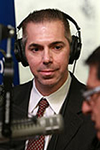Biocentrism Wiki – Robert Lanza
– From WIKIPEDIA Read More
Stem cell pioneer Robert Lanza has been on the frontier of cloning and stem cells for more than a decade, so he’s well-acclimated to controversy. But his book “Biocentrism” is generating controversy on a different plane. Does all this make a difference in daily life, or how you see the world? Take a look at the free sample of “Biocentrism.”
“One of the finest & best current books I have read on the subject of human “consciousness.” Lanza is a genius of first magnitude … When they write the list of this Century’s most important books, you can bet the farm this title will be near the top.”
‒ Robert Steven Thomas TOP 500 REVIEWER, Amazon.com

“My special guest is Dr. Robert Lanza and his extraordinary mind, I just finished reading his book Biocentrism and I said to myself, ‘Finally, aha, somebody that I can totally relate to.’”
“Deepak Chopra”
“TIME Magazine: Top 100 Icons of the Century”

“My special guest is Dr. Robert Lanza and his extraordinary mind, I just finished reading his book Biocentrism and I said to myself, ‘Finally, aha, somebody that I can totally relate to.’”
“Deepak Chopra”
“TIME Magazine: Top 100 Icons of the Century”
The theory that blew your mind in Biocentrism and Beyond Biocentrism is back, with brand-new research revealing the startling truth about our existence.
What is consciousness? Why are we here? Where did it all come from? All of it, the laws of nature, the stars, the universe. Humans have been asking these questions forever, but science hasn’t succeeded in providing many answers – until now. In The Grand Biocentric Design, Robert Lanza, one of Time Magazine’s “100 Most Influential People,” is joined by theoretical physicist Matej Pavsic and astronomer Bob Berman to shed light on the big picture that has long eluded philosophers and scientists alike.
The Grand Biocentric Design is a one-of-a-kind, groundbreaking explanation of how the universe works, and an exploration of the science behind the astounding fact that time, space, and reality itself, all ultimately depend on us.
“quite thrilling … its notions are exciting ones, and they do a sound job of linking them to observable, replicable experiments. Fans of revolutionary science—or just big, cerebral questions—will enjoy this ambitious work. A thought-provoking dispatch from the frontier of physics.” —Kirkus Reviews
“a masterpiece”—Anthony Atala, W. Boyce Professor, Wake Forest University
“paradigm-shattering”―Lucian Del Priore, Robert R. Young Professor, Yale University
“It’s fabulous—I couldn’t put it down!” —Ralph Levinson, Professor Emeritus, UCLA
All human knowledge is relational. “Discordant opinions,” said Emerson “are reconciled by being seen to be two extremes of one principle.”

Both science and religion appear to be honing in on a deeper reality, one totally ignored by most people until now.

Why out of all of existence do you get to be, say, just a plumber or a hairdresser — followed by nothingness for the rest of eternity.

An amazing set of experiments suggest that events in the future may influence things happening in the world now. The past, present and future are inseparably entangled.

The contemplation of time and the discoveries of modern science suggest that the mind is the ultimate reality, paramount and limitless.

New experiments suggest part of us exists outside of the physical world. We assume there’s a universe “out there” separate from what we are, and that we play no role in its appearance. Yet experiments show just the opposite.

What happens if we project our current scientific knowledge into the future? A new scenario suggests the evolution of a new concept of God.

Experiments suggest life cannot be destroyed. According to Biocentrism, consciousness can’t be extinguished in a timeless, spaceless world.

What sustains us in and above the void of nothingness? We can’t see the laws that uphold the world, and that if they be removed the Universe would collapse to nothing.

Experiments suggest we create time, not the other way around. Life is just one fragment of time, one brushstroke in a picture larger than ourselves, eternal even when we die.

The mystery of life and death cannot be examined by visiting the Galapagos or looking through a microscope. Even Einstein realized this isn’t the case.